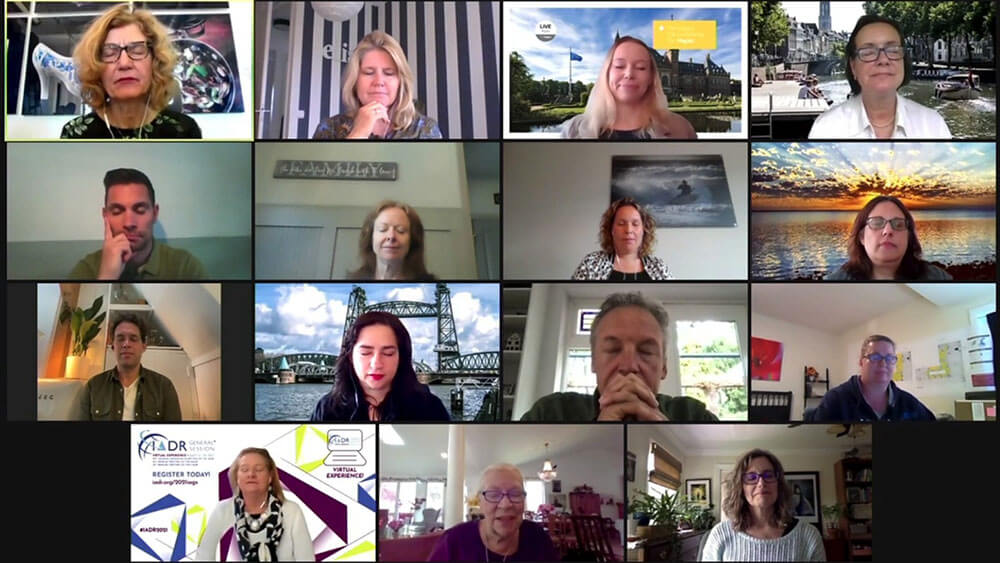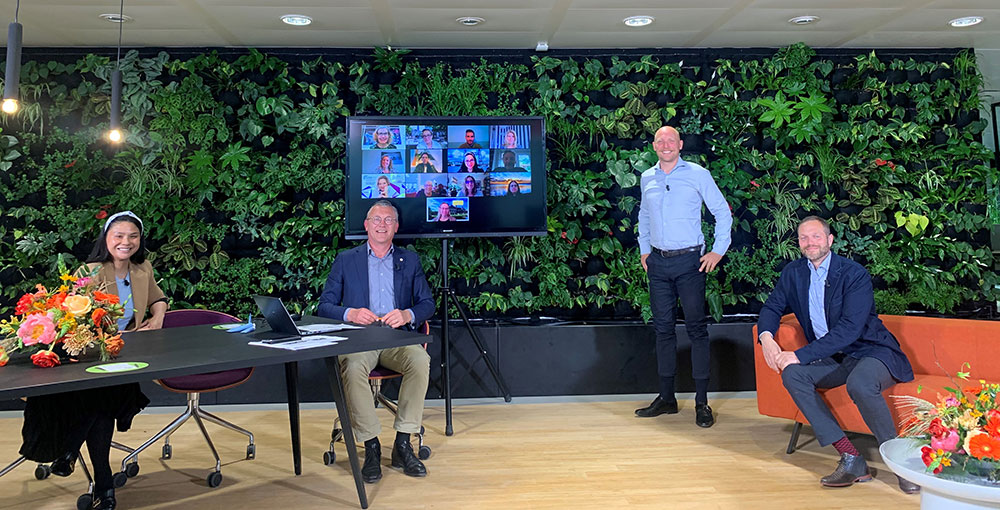
Participants in the May 11 Netherlands Board of Tourism & Conventions DisConnect virtual master class, “An Hour of Brain and Flower Power,” do a meditation exercise. (Courtesy NBTC)

Michelle Russell
It was a crazy busy week for me in mid-May and I questioned my wisdom in accepting an invitation to participate in the Netherlands Board of Tourism & Conventions (NBTC) DisConnect virtual master class — “An Hour of Brain and Flower Power” — in the middle of a packed workday. But it turned out to be, of course, just the break I needed.
NBTC has been hosting virtual master classes during the pandemic as an innovative way of connecting with meetings industry professionals while helping them temporarily disconnect from “the overflow of information.” This particular session included meditation, a skincare pampering segment with the first beauty products derived from tulips, and an introduction to the country’s sustainable and state-of-the-art flower industry, with a video of stunning blooms that could restore anyone’s soul.
Meditation has never been my thing — I’m just not successful in quieting my inner chatter. (Perhaps my coffee addiction is to blame.) But as I was onscreen during the Zoom session, I dutifully closed my eyes and followed along as Ruben Oude Rikmanspoel of The Air Academy in the Netherlands led us through a series of breathing exercises. Breathe in. Hold your breath for a count of four. Breathe out. I couldn’t help but feel much more relaxed and recharged.
We all take our breathing for granted — and also perhaps the air we breathe.
But as we’re learning, when it comes to indoor spaces and COVID transmission, that’s something we can no longer afford to do. In our story, “Why Air Quality Must Be Part of Venues’ Hygiene Protocol,” we talk about how, as an industry, we’ve focused our pandemic health and safety efforts on disinfecting surfaces at venues because that is how we first thought COVID spread. But scientists discovered, pretty early on, that it’s far more likely for the virus to be transmitted via aerosols indoors.
I think the only time I’ve ever been concerned about stale air is during flights, and it turns out that I was dead wrong — the airflow in jet airliners is much faster than normal indoor buildings. Half of it is fresh air from outside and the other is recycled through HEPA filters of the same type used in hospital operating rooms, according to JAMA Network.
But we should be concerned about airplane travel in a post-COVID world for an entirely different reason as the headline of a recent Fast Company article spelled out: “The Pandemic Killed Business Travel. For the Sake of the Climate, It Should Stay Dead.” “Despite its outsize carbon footprint,” the article reads, “business travel has been seen as a socially acceptable form of pollution. The pandemic has forced a reckoning.”
Conventions and conferences fall under the umbrella of business travel, so until the world has a greener air transportation system, planners can factor in potential participants’ heightened sustainability concerns — along with their travel budget cuts, economic considerations, higher comfort level with learning online, and health fears — when estimating how their in-person attendance will come back in a post-pandemic world.
Breathe in. Breathe out.
Speaking of Sustainability
Feeding crowds looks very different today, thanks to COVID. But in an effort to keep the coronavirus at bay, do we have to package food items in single- serve plastic ware and go backwards in our progress toward zero waste? Managing Editor Jennifer N. Dienst takes a look in our F&B story, “A Balanced Diet.”
Michelle Russell is editor in chief of Convene.

Ruben Oude Rikmanspoel of The Air Academy (standing) led participants through a series of breathing exercises. Masterclass host Eric Bakermans (second from left) spoke with Kim van Haaster, co-founder/CEO of Bloomeffects (left) and Auke Heins, manager of Trade Fairs & Events, Royal FloraHolland (right), about the floral industry in The Netherlands.
